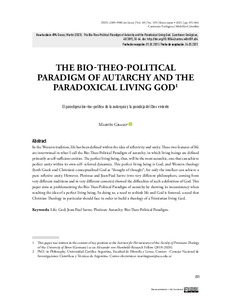Por favor, use este identificador para citar o enlazar este ítem:
https://repositorio.uca.edu.ar/handle/123456789/12378| Título: | The bio-theo-political paradigm of autarchy and the paradoxical living God El paradigma bio-teo-político de la autarquía y la paradoja del Dios viviente |
Autor: | Grassi, Martín | Palabras clave: | VIDA; TEOLOGIA; POLITICA; DIOS; AUTARQUIA; SER HUMANO | Fecha de publicación: | 2021 | Editorial: | Universidad Pontificia Bolivariana. Facultad de Teología | Cita: | Grassi, M. The bio-theo-political paradigm of autarchy and the paradoxical living God [en línea]. Cuestiones Teológicas. 2021, 48 (109). doi: 10.18566/cueteo.v48n109.a04. Disponible en: https://repositorio.uca.edu.ar/handle/123456789/12378 | Resumen: | Abstract: In the Western tradition, life has been defined within the idea of reflexivity and unity. These two features of life
are intertwined in what I call the Bio-Theo-Political Paradigm of autarchy, in which living beings are defined
primarily as self-sufficient entities. The perfect living being, thus, will be the most autarchic, one that can achieve
perfect unity within its own self- referred dynamics. This perfect living being is God, and Western theology
(both Greek and Christian) conceptualized God as “thought of thought”, for only the intellect can achieve a
pure reflexive unity. However, Plotinus and Jean-Paul Sartre (two very different philosophers, coming from
very different traditions and in very different contexts) showed the difficulties of such a definition of God. This
paper aims at problematizing the Bio-Theo-Political Paradigm of autarchy by showing its inconsistency when
reaching the idea of a perfect living being. In doing so, a need to rethink life and God is fostered, a need that
Christian Theology in particular should face in order to build a theology of a Trinitarian living God. Resumen: En la tradición Occidental, la vida ha sido definida alrededor de las ideas de reflexividad y unidad. Estas dos características de la vida se encuentran entrelazadas en lo que denomino el paradigma bio-teo-político de la autarquía, en el cual los seres vivos se definen principalmente como entidades autosuficientes. Así, el ser vivo perfecto sería el más autárquico, aquel que pudiese obtener la unidad perfecta dentro de su propia dinámica autorreferencial. Este ser vivo perfecto es Dios. La teología Occidental (tanto griega como cristiana) ha conceptualizado a Dios como “pensamiento de pensamiento”, ya que solo el intelecto puede alcanzar una unidad reflexiva pura. Sin embargo, Plotino y Jean-Paul Sartre (dos filósofos con amplias diferencias, que vienen de tradiciones y contextos significativamente distintos) mostraron las dificultades de definir a Dios de esta manera. El artículo se propone problematizar el paradigma bio-teo-político de la autarquía al mostrar la inconsistencia que surge cuando considera la idea de un ser vivo perfecto. En este ejercicio, se promueve la necesidad de repensar la vida y a Dios, la cual debería ser abordada por la teología cristiana para desarrollar una teología de un Dios trino viviente. |
URI: | https://repositorio.uca.edu.ar/handle/123456789/12378 | ISSN: | 2389-9980 (en línea) | Disciplina: | FILOSOFIA | DOI: | 10.18566/cueteo.v48n109.a04 | Derechos: | Acceso abierto | Fuente: | Cuestiones Teológicas. 2021, 48 (109) |
| Aparece en las colecciones: | Artículos |
Ficheros en este ítem:
| Fichero | Descripción | Tamaño | Formato | |
|---|---|---|---|---|
| bio-theo-political-paradigm.pdf | 147,25 kB | Adobe PDF |  Visualizar/Abrir |
Visualizaciones de página(s)
51
comprobado en 27-abr-2024
Descarga(s)
70
comprobado en 27-abr-2024
Google ScholarTM
Ver en Google Scholar
Altmetric
Altmetric
Este ítem está sujeto a una Licencia Creative Commons

